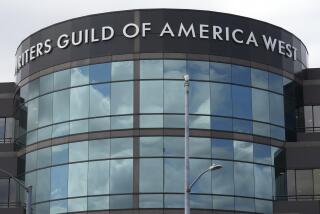WGA and DGA Agree on Creative Input : Movies/TV: The accord may give writers more say in film making. Directors may get a stronger voice in TV.
- Share via
For decades, screenwriters have looked up from the bottom of the Hollywood totem pole: Their handsome salaries have never quite eased the pain of routinely being cut out of key decisions about the films they script.
But a new agreement between two major Hollywood labor unions--the Writers Guild of America, West and the Directors Guild of America--could give screenwriters more input into the movie-making process, where the director has long been considered the creative king. In return, television directors could gain more control over their episodic shows, where the producer, who often is a WGA member, normally reigns.
“We believe this cooperative venture will enhance the creative input of both writers and directors,” said WGA Executive Director Brian Walton. “From the writer’s point of view, we hope that over time it will effectively change the presumption of the writer’s role, in cooperation with the director.”
Directors and screenwriters have long been at each other’s throats over the issue of creative control of movies and TV shows. In feature films, the DGA historically has tried to preserve the role of the director as the principal architect of movies, a status they have always enjoyed in Europe.
The battle reached a climax during the 1988 Hollywood writers’ strike, when the directors’ guild publicly threatened to sue any studio that agreed to WGA proposals on story credits and on increasing writers’ creative control over their scripts.
The WGA-DGA agreement, announced Wednesday, pledges more cooperation between the two guilds and states that the two labor unions will refrain from making collective bargaining proposals with the studios that would trample on each other’s creative rights. The two guilds also plan to develop voluntary guidelines on the issue of creative control.
“It portends a new beginning,” said DGA executive director Glenn Gumpel. “I think if directors and writers work together, you’re going to see from a creative standpoint the emergence of another interesting base in the community.”
Officials at both guilds hope to provide a united front during their collective bargaining negotiations with the studios. Studio representatives reacted positively to the agreement. “This will make creative bargaining easier,” said J. Nicholas Counter, president of the Alliance of Motion Picture and Television Producers, which represents the studios. “We’ve had conflicting claims to various creative rights.”
One driving force behind this week’s agreement was a broad set of DGA demands--made during its latest collective bargaining talks with the studios--that would have been objectionable to the writers. The DGA apparently dropped those demands. Instead, its board last weekend approved a tentative contract under which the studios agreed not to make a collective bargaining agreement with any other union that infringes on directors’ creative rights. The contract, which also addresses pay and other concerns, goes before the full membership for a vote Feb. 15. The new WGA-DGA agreement is only a first step: There’s no guarantee that these two warring factions can come to terms over such specific questions as how much input screenwriters should have into the casting or location of a movie, or whether TV directors will be able to gain more control over their shows from the producers who hire them.
Moreover, the agreement does not address one of the most emotional disputes between directors and writers: Who should receive credit as the creative force behind a film. The agreement may, however, address that question in the future.
More to Read
The biggest entertainment stories
Get our big stories about Hollywood, film, television, music, arts, culture and more right in your inbox as soon as they publish.
You may occasionally receive promotional content from the Los Angeles Times.










